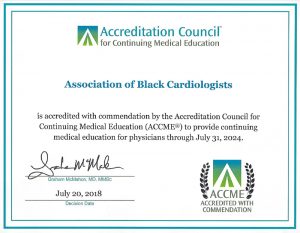Events and Programs
ABC offers continuing education opportunities that provide the most current, evidence-based information to health care practitioners. The ABC and its collaborating partners design educational programs to foster professional development and enhance the provision of patient care. The expected results are to increase professional competence, improve performance in practice and improve patient outcomes.
On-Demand Sessions
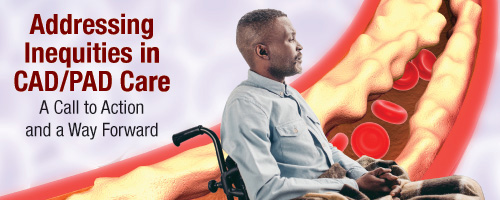 |
Addressing Inequities in CAD/PAD Care: A Call to Action and a Way Forward Episode 2
On-Demand CME News Broadcast Medscape Education This complimentary CME activity is available for up to 0.50 hour of AMA PRA Category 1 Credit™. With ABC Member: Foluso Fakorede, MD |

Medscape Education
This activity is intended for primary care physicians, cardiologists, and diabetologists/endocrinologists. The goal of this program is for learners to be better able to understand how social determinants of health manifest as health inequities and contribute to CVD-related morbidity and mortality.
With ABC Members: Karol E. Watson, MD, PhD and Modele O. Ogunniyi, MD, MPH
Credit available: 0.25 CME / ABIM MOC
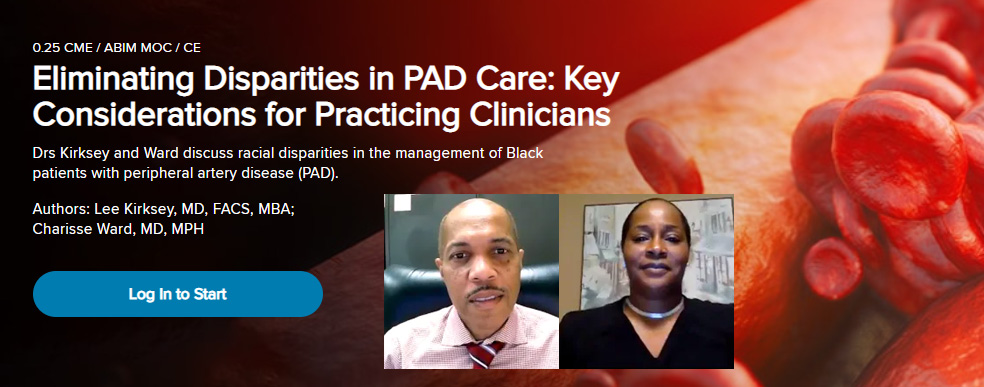
Eliminating Disparities in PAD Care: Key Considerations for Practicing Clinicians
Join Lee Kirksey, MD, FACS, MBA and Charisse Ward, MD, MPH to review the factors that contribute to disparities in care for Black patients with peripheral artery disease and gain key strategies for optimizing the use of guideline-directed antithrombotic therapy in Black patients with PAD. This activity is intended for cardiologists, surgeons, primary care physicians, nurse practitioners and nurses. Developed through a collaboration between the ABC and Medscape Education and supported by an independent educational grant from Janssen Pharmaceuticals Inc.
Credit available: 0.25 CME / ABIM MOC
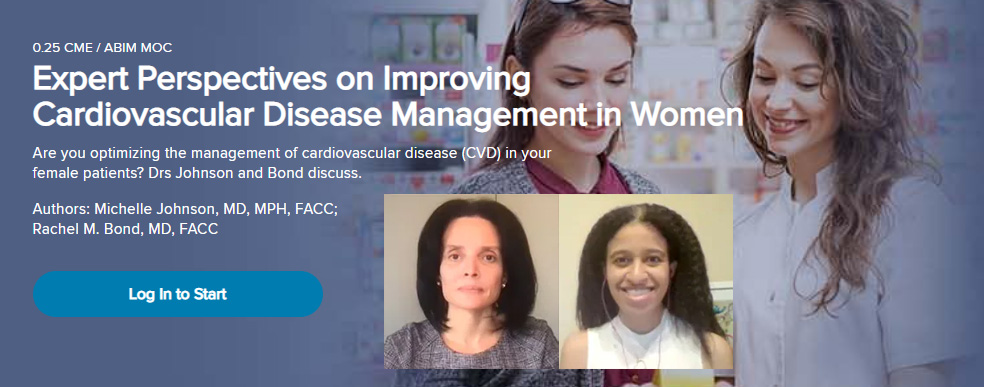
Expert Perspectives on Improving Cardiovascular Disease Management in Women
Medscape Education
Join Michelle Johnson, MD, ABC Board Member and Rachel M. Bond, MD, Co-chair for the ABC Cardiovascular Disease in Women and Children Committee, to gain a better understanding of strategies to enhance CVD management, including cardio-prevention, in women. This activity is intended for primary care physicians, cardiologists, and diabetologists/endocrinologists. Developed through a collaboration between the ABC and Medscape Education and supported by an independent educational grant from Bayer.
Credit available: 0.25 CME / ABIM MOC

Considerations for Heart Failure Management in the African American Population
- Identify patient-centric risk factors for development and progression of HF in a racially diverse patient population
- Review best-practice recommendations for pharmacological management of HF, with a focus on African American patients
- Discuss safety, efficacy, and clinical-outcomes data related to new and emerging therapies for HF
With ABC Members Drs. Martha Gulati and Clyde Yancy
Credit available: AMA PRA Category 1 Credit™

Addressing Inequities in CAD/PAD Care: A Call to Action and a Way Forward
Paradigm Medical Communications, LLC
Join Fakorede Foluso, MD, Co-Chair of the ABC PAD Initiative, and Joshua A. Beckman, MD, MS, Director, Vascular Medicine Vanderbilt University Medical Center, for a two-episode series on health disparities in the care and management of coronary artery disease (CAD) and peripheral artery disease (PAD). This activity has been designed for general cardiologists, interventional cardiologists, vascular surgeons, hospitalists, primary care providers, podiatrists, endocrinologists, nurse practitioners, PAs, and other clinicians who are interested in the diagnosis and management of patients with CAD and/or PAD.
This series is provided by Paradigm Medical Communications, LLC. In collaboration with the Association of Black Cardiologists (ABC).
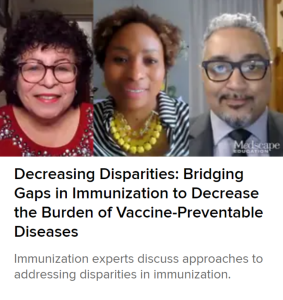
Faculty for this course:
Elena Rios, MD, MSPH, MACP
Lakesha M. Butler, PharmD
Zeke J. McKinney, MD, MHI, MPH, FACOEM

Obstacles and Opportunities: How Do We Increase Adult Immunization Rates?
Faculty for this course:
LJ Tan, MS, PhD
Robert H. Hopkins, Jr., MD
Mitchel C. Rothholz, RPh, MBA
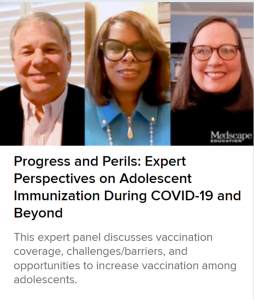
Progress and Perils: Expert Perspectives on Adolescent Immunization During COVID-19 and Beyond.
Faculty for this course:
Henry (Hank) Bernstein, DO, MHCM, FAAP
Tamera Coyne-Beasley, MD, MPH, FAAP, FSAHM
Patricia (Patsy) A. Stinchfield, RN, MS, CPNP
The Immunization Resource Center: Advancing Protection Against Vaccine-Preventable Diseases

Downloadable Slide Kit
ABC Conferences & Symposia
Upcoming Live Conferences
Cardiovascular Courses (Managed by NACE)

Managing Heart Failure in Primary Care: Taking Control and Driving Better Patient Outcomes Webcast
COURSE SUMMARY
Cost: Free
Start Date: 6/24/2022
Expiration Date: 6/23/2023
Target Audience: Primary care physicians, nurse practitioners , physician assistants, and other clinicians managing patients with heart failure
Format: Webcast
Estimated Time To Complete CME Activity: 1.0 hour
Credits:
1.0 AMA PRA Category 1 CreditsTM
1.0 AANP Contact hour which includes 0.50 pharmacology hours
Hardware/Software Requirements: Any web browser
Register Now

Getting on Track and Staying There: Lipids and ASCVD Risk
COURSE SUMMARY
Cost: Free
Start Date: 10/1/2022
Expiration Date: 9/30/2023
Target Audience: Primary care physicians, nurse practitioners, physician assistants, and other clinicians managing patients with hypercholesterolemia
Format: Webcast
Estimated Time To Complete CME Activity: 1.0 hour
Credits:
1.0 AMA PRA Category 1 CreditTM
1.0 AANP Contact hours which includes 0.75 pharmacology hours
Hardware/Software Requirements: Any web browser
Register Now

Advances in HFrEF – New Guidelines and Evolving Options
COURSE SUMMARY
Cost: Free
Start Date: 11/1/2022
Expiration Date: 10/31/2023
Target Audience: cardiologists, nurse practitioners, physician assistants, and other clinicians engaged in the care of patients with heart failure.
Format: Webcast
Estimated Time To Complete CME Activity: 1.0 hour
Credits:
1.0 AMA PRA Category 1 CreditTM
1.0 AANP Contact hour which includes 0.50 pharmacology hours
Hardware/Software Requirements: Any web browser
Register Now
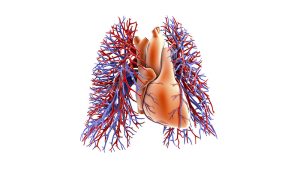
Advances in PAH Care – Are You on the Right Path?
COURSE SUMMARY
Cost: Free
Start Date: 11/1/2022
Expiration Date: 10/31/2023
Target Audience: Cardiologists and primary care clinicians, nurse practitioners, physician assistants, and other clinicians engaged in the care of patients with cardiac conditions.
Format: Webcast
Estimated Time To Complete CME Activity: 1.0 hour
Credits:
1.0 AMA PRA Category 1 CreditTM
1.0 AANP Contact hour which includes 0.5 pharmacology hours
Hardware/Software Requirements: Any web browser
Register Now

Novel Treatment Options in Hypertrophic Cardiomyopathy
COURSE SUMMARY
Cost: Free
Start Date: 11/1/2022
Expiration Date: 10/31/2023
Target Audience: Cardiologists and primary care clinicians, nurse practitioners, physician assistants, and other clinicians engaged in the care of patients with cardiac conditions.
Format: Webcast
Estimated Time To Complete CME Activity: 1.0 hour
Credits:
1.0 AMA PRA Category 1 CreditTM
1.0 AANP Contact hour which includes 0.5 pharmacology hours
Hardware/Software Requirements: Any web browser
Register Now

Individualizing Lipid Lowering to Impact Cardiac Risk
COURSE SUMMARY
Cost: Free
Start Date: 12/1/2022
Expiration Date: 11/30/2023
Target Audience: Cardiologists and primary care clinicians, nurse practitioners, physician assistants, and other clinicians engaged in the care of patients with cardiac conditions
Format: Webcast
Estimated Time To Complete CME Activity: 1.0 hour
Credits:
1.0 AMA PRA Category 1 CreditTM
1.0 AANP Contact hour which includes 1.0 pharmacology hour
Hardware/Software Requirements: Any web browser
Register Now
2018-2024 ACCME CME Accreditation

